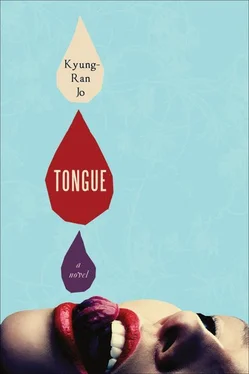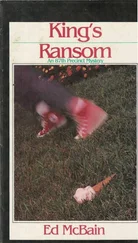In a situation like this, it’s uncomfortable to talk to someone who’s older. Chef’s tone is that of a person who’s lived his entire life according to his convictions and beliefs. Afraid that his voice will grab me by the throat and shake me as if with a big hand, I quickly ask, “So I can start tomorrow, right?”
All I’m here to do is to find work. Nobody is allowed to say that my relationship is over, not yet. I suppress the urge to slink quietly out the back door and force myself to watch his eyes. The thing more terrifying than splitting up with him is that I’m still with him in my heart even though we’re not together anymore. I mean, maybe it’s a test—if you want to know someone, if you really want to know someone, you have to try a separation, maybe just once, just this one time. Please don’t ask me about it right now .
“So you still have that habit of staring someone in the eyes,” Chef says.
“I haven’t changed at all.”
“There’s something that’s different.”
I don’t say anything.
“End it while you still can. Stop dragging your feet. It’ll be much easier after some time passes.”
“I guess it’ll get better by the time it’s peak croaker season.” Summer. At 5:05 P.M. on January 20, the midwinter point according to the traditional Chinese calendar and supposedly the coldest day of the year, I am talking out of the blue about summer. Chef gets up, grunting from the exertion. The kitchen is at its busiest at this time.
“Eat something before you go,” Chef suggests.
“Don’t you have a lot of covers?”
“Then go.”
“No, no, I’m hungry. What’s good today?”
“Sea bass.”
“Okay, then I’ll have some sea bass.”
WHEN I SEE a house whose living room is brightly lit in the middle of the night, I think of two possibilities. Two people sitting across from each other, swirling glasses of wine, lit by subtly scented candles. Or two people fighting, arguing like it will never end. People don’t have spats in the dark. In the dark people make love or talk. The far superior option is to eat as you talk. Anyway, it’s not a good sign that the lights are on in our house late into the night. The thing I want to do most right now isn’t make love or talk or cook. I want to walk around the whole house, barefoot, and slowly switch off all the lights. Usually at this time, I’m in the bedroom or in the kitchen with the lights dimmed, making a simple late-night snack. But right now I’m not doing either. I can’t believe all the lights are on at one in the morning, like at a hatchery. I watch him as he walks around the house, unrushed, packing his things.
He used to say, At night, I sit on the sofa like this and think about the happiest moment of my day. Then I get up slowly, turn out every light in the house, and go into the bedroom calm and relaxed. I close the door gently. I pull back the sheets and lie in bed, and I can smell the dried lavender from my pillow. The most important thing is that you’re always lying there next to me.
Once a friend said that falling in love is like carving a word on the back of your hand. Even if you rub it out as hard as you can, a faint residue is left behind. So you have to be certain that you really want it. Make sure you think about it.
Even though she’d never met him, my friend talked about him a lot. No, I talked about him a lot and she must have been listening. And she remembered everything I said. You’re right. I need to be certain about it right now, certain that this isn’t the end—it can’t be over like this .
“Come here, Paulie!” he calls.
Paulie, who was hunched by my feet, glances up at me, gets up slowly, and pads over to him. By now Paulie and I both know what this means. It means that he has something to say to me. I’m not sure when it started, but he calls Paulie’s name instead of mine. I caress the cutting board with one hand and walk into the living room.
“I’m going to have people come and pack up that painting. I’ll tell them to call to make sure you’re home. I took care of all of our accounts at the bank, too. There shouldn’t be anything that you have to manage by yourself. I’ll call if I’ve forgotten something… I don’t really know how we’re supposed to deal with something like this. I’m going to Dubai for work in a week. I’ll be there for about two weeks. I don’t think I can leave the key, though, because I have to come see Paulie.” He clamps his mouth suddenly, as if he’s uncomfortable. If we’d had a child, would he have said he’d come by to see the kid like that? I don’t know what the end of a relationship is supposed to be like either—do I hurry up and say what I need to say as if I’m being chased, just as he’s doing, or do I cry and buy some time?
“Do you want something to eat?” I ask, studying his sallow face.
“Huh. You’re so unemotional.” He leaks a smile.
It’s not the most adequate thing to say to someone who’s walking out on you, but I can’t think of anything better. I wouldn’t know of anything better to say anyway. Gogol wrote extensively about food, and was undoubtedly obsessed with it. The couples in his stories always express their love by feeding each other smoked sturgeon, fruit jelly, sausage, pancakes, mushrooms, melons. One couple eats eleven-course meals daily. One day, the husband suggests to his dying wife, “Perhaps you would eat a little something.” After she dies, he sheds tears at the sight of her favorite dishes. The man ends up starving himself to death. I wish someone would suggest the same thing to me right now: Perhaps you would eat a little something. I would probably say that to him when he’s on his deathbed, urging, It’s not too late, just ask for it and I’ll make it for you. What about a slab of rare steak like that first time?
I remember the day he came into the restaurant to look for me. Cooks rarely come out of the kitchen. Even Chef never goes into the dining room during service unless someone he knows comes to the restaurant. Chef doesn’t trust cooks who meddle in the affairs of the dining room and sternly prohibited me from doing so. That evening was the first time I went onto the floor during dinner service. Manager Park, clad in a stylish white shirt and black vest, called me in— Ji-won, a customer came in with your business card. He wants you to make him this dish. Do you know him? Oh, okay, I replied, but I wondered who it was. I glimpsed the person’s face, the one who’d come in with my business card and ordered steak. I stared at him like I had the first time I saw him.
Yes. It was him. I had met him at a pizzeria in Napoli, where I had worked for ten days for no pay to learn how to make pizza. My face flushed. It had been one month since I’d returned to Seoul. And here he was, thirty days after our first meeting.
I went back to the grill station to sear the herb-marinated beef and cut a cross into the top of a potato to stick it in the oven. Sweat rolled off my face. The tiramisu I’d made in the morning had come out exceptionally well, and I’d taken a thirty-minute nap in the afternoon. And he had come here in the evening. When I go to bed later, I may be in an even better mood, I thought, as if chanting a spell. It wouldn’t do if I thought about something sad or if I were stressed, because those emotions could seep into my cooking. I laughed out loud. I turned over the steak. It’s going to be fantastic, I said, loud enough for the potato to hear me. I filled the opening of the potato with crème fraîche. I slid my knife under the beef and moved it from the grill, plating it in the center of the platter. I added some mustard sauce as well as some roasted asparagus, which usually wasn’t part of the dish. It was done. I placed the platter on the pass. Which wine did he order? I asked Manager Park. Barolo Zonchera, he replied. A solid choice. Manager Park lifted the platter easily and headed toward his table. I supported myself on the pass with both arms, my upper body sticking out. I could see him unfold the napkin onto his lap and slowly pick up his fork and knife.
Читать дальше












